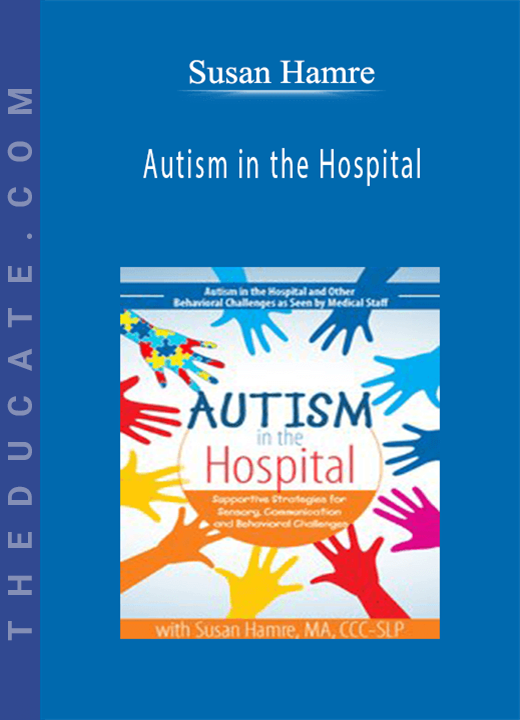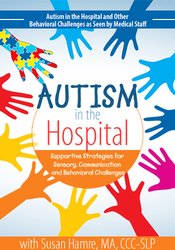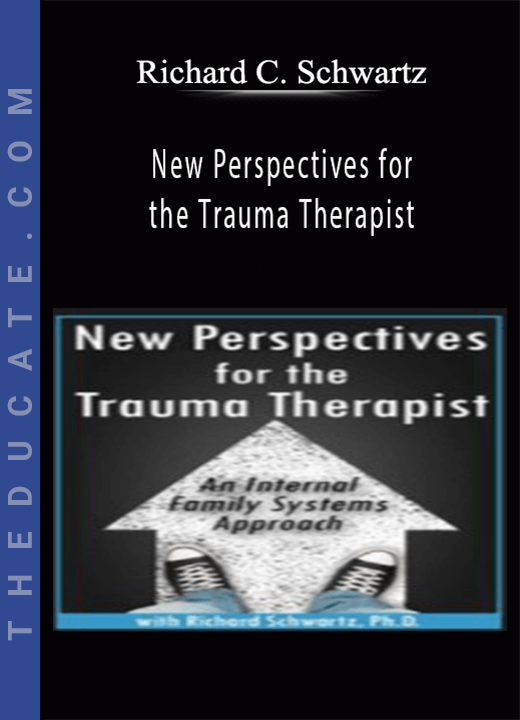Description
-
Susan Hamre – Autism in the Hospital: Supportive Strategies for Sensory, Communication and Behavioral Challenges
- Faculty:
- Susan Hamre
- Duration:
- 5 Hours 44 Minutes
- Format:
- Audio and Video
- Copyright:
- Mar 27, 2018
- Sensory, communication and behavioral challenges that impact successful medical treatment
- Strategies for ER triage, routine hospital visits, surgery and more
- Roadmap for treating a non-verbal, non-responsive individual with autism
- ‘Stimming’ behaviors as a strategy
- Subtle sign of less obvious ASD
- Can’t answer your questions or identify levels of pain?
- Refuses to have blood drawn, give urine a sample, do dialysis or CT/MRI scan?
- Attempts to pull out lines or pull off bandages?
- Fights you off with piercing screaming and flapping of the arms?
- Can’t tolerate your touch and or make eye contact with you?
- Won’t stop running out of the treatment room?
- Refuses medication?
- Hospital/EMT equipment to help support sensory needs
- Overcoming the most common sensory triggers
- Communication cards, checklists and Apps as visual supports
- Social stories to break down hospital/EMT procedures
- Navigate ER triage, routine hospital visits, labs and tests
- What to do when a meltdown occurs
- Calming techniques
- Autism in Medical Settings: Challenges and Supportive Strategies
- Sensory Integration Challenges
- Stimulation dysregulation (hypo/hyper)
- Seeking/avoiding/both
- Processing functions
- May not process nor perceive pain
- Common triggers within the hospital/ER environment
- Your hospital/ER as a ‘sensory minefield’
- Sensory Strategies
- Patient passport with sensory triggers listed
- Quickly create ASD friendly environment
- Allow sensory needs to occur to prevent a meltdown
- How to avoid most common sensory triggers
- Hospital equipment to help support sensory needs
- Social / Communication Challenges
- Social interaction holds the ‘key’… or not
- Literal translation of spoken language
- When they are non-verbal or unable to read body language
- Delayed auditory processing
- Impact of anxiety on communication
- Non-compliance and verbally offensive
- Social/Communication Strategies
- Communication cards, checklists and Apps as visual supports
- Social stories to break down hospital procedures
- Their interests or repetitive behaviors to generate your ‘connection’
- Make allowances for family to be nearby
- Behavior Challenges
- Noting functions of behavior
- May bolt/escape/elope
- Aggression occurs as anxiety increases
- Might resist restraint
- Anxiety may increase when transport is needed intolerant of transitions in general
- Likely to be resisting lack of known/familiar routine
- Attempt to pull out lines, pull off bandages, etc.
- Refuse medication
- Behavioral Management Strategies
- Is it a meltdown or tantrum?
- Know the child’s triggers
- Plan ahead to avoid triggers
- Specific calming techniques
- What to do when a meltdown occurs
- Navigating ER triage, routine hospital visits, labs and tests
- Visual schedules for what is going to be happening
- Strategies for loud noises and being touched
- Visual timetables and timers for transitions/ changes
- Motivation and reward systems that work
- What you need to know about non-sensory triggers
- ‘Stimming’ as a calming technique
- Sensory Integration Challenges
Description
Do you know how to give medical attention to a patient with autism who:
Whether the medical appointment is scheduled or it’s a trip to the emergency room the hospital can be a sensory minefield for someone with autism causing them to spiral toward a terrifying meltdown. Sedation and four-point restraint are not practical solutions.
Your connection to your autism patient will depend upon how quickly you can move into their world. Through case examples, videos and lively class discussion you will walk away with practical strategies for successful medical treatment of an individual with autism, such as:
Handouts
| Manual (21.40 MB) | 81 Pages | Available after Purchase |
Outline
Faculty

Susan Hamre, MA, CCC-SLP Related seminars and products: 7
Susan Hamre, MA, CCC-SLP, is an ASHA certified speech-language pathologist with over 40 years of clinical, teaching and research experience with autism in the home, school, hospital and community settings. She owns and manages a private practice in Santa Fe, New Mexico that serves individuals from infancy to adulthood, with an emphasis on Early Intervention, autism and various other challenging conditions. A clinician at heart, Susan has personally provided treatment for children as young as nine months, on up. She has had the pleasure of working with some individuals and their families for over 20 years.
Susan is a national presenter teaching treatment strategies for autism to rehab professionals, mental health clinicians and educators. She provides autism trainings to First Responders (Crisis Intervention Teams, firefighters and EMT. Susan was the Director of the Autism Training Center at Giant Steps in Illinois, where trained first responders, transportation systems, park districts, small and large venues, nursing colleges, medical centers, parent groups and public school systems. Years of professional experience backs up her ability to speak on this subject with conviction and passion.
Susan has made five Operation Smile mission trips; four to the Philippines and one to Africa. While those trips were medical in nature (cleft lip and palate), on every one of those trips, she was privy to identify the existence of probable autism, then steering the families in the right direction. Those situations underscore her belief that with trained eyes, the unique set of characteristics that cloak autism can be spotted at a very young age, in all sorts of environments and even when the same language is not being spoken.
Speaker Disclosures:
Financial: Susan Hamre maintains a private practice. She receives a speaking honorarium from PESI, Inc.
Non-Financial: Susan Hamre has no relevant non-financial relationship to disclose.







11 reviews for Susan Hamre – Autism in the Hospital: Supportive Strategies for Sensory, Communication and Behavioral Challenges
There are no reviews yet.